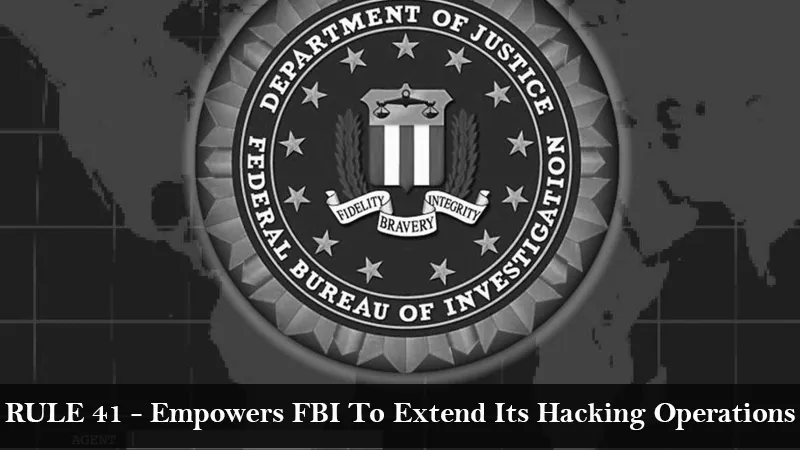The FBI and other security agencies can now search computers with a single search warrant because of a controversial Rule 41 that came into effect last Thursday.
The expanded search authorization, known as ‘Rule 41,’ makes it easy for the FBI to breach computers legally during investigations. Until now, the law enforcement agencies could only search computers within the district where the warrant is issued, typically within the state.
The legal operation of government hacking attempts in the past has been a contentious topic, such as ‘playpen‘ investigation in which government placed tracker programs in suspects’ computers allege to involve in pedophilia across the country. However, the defendants were able to challenge their arrests successfully on the basis that they lived outside the covered area described in the warrant.
Civil liberties groups have notified that the Rule-41 would dangerously expand the government’s surveillance power and creates new risks related to forum shopping – seeking warrants from any district and judge would most likely to grant them.
The controversy led to bipartisan groups within the lawmaking authorities and halted the new Rule 41 powers until the Congress reading. On Wednesday, Senator Chris Coons (D-Del) announced a call for a voice vote to pass a bill delaying Rule 41. However, the measure lacked support in the House.
A spokesman from the EFF, which led the opposition to the rule change, says that the Congress can still amend or halt the bill even if it goes into effect.
Rule-41 presented for a regular review of criminal procedure in a conference of federal judges, and after weighing the rule and a public comment period, the conference submitted the suggested rule change to the Supreme Court, which can come into effect on Dec. 1 upon approval.
Opposition to Rule-41 have arguments that are not some housekeeping measure that should ordinarily be addressed by the judicial conference, but it would significantly affect how police conduct its search and seizure, and that it may violate the Fourth Amendment of the Constitution.
The debate over Rule-41 will likely to continue under the forthcoming Presidency of Donal Trump.
Share this article
About the Author
Peter Buttler an Infosec Journalist and Tech Reporter, Member of IDG Network. In 2011, he completed Masters in Cybersecurity and technology. He worked for leading security and tech giants as Staff Writer. Currently, he contributes to a number of online publications, including The Next Web, CSO Online, Infosecurity Mag, SC Magazine, Tripwire, GlobalSign CSO Australia, etc. His favorite areas Online Privacy, AI, IoT, VR, Blockchain, Big Data, ML, Fintech, etc. You can follow him on twitter.
More from Peter ButtlerRelated Posts

Passengers’ Data Stored on User Devices, not on DigiYatra Storage, says India Govt
KEY TAKEAWAYS Unblocking streaming content from Amazon Prime is easy only if you know the reliable V...

NCSC Chief: Clear Rules Needed to Prevent Cyberspace Conflict and Struggle
A safe and secure digital world necessitates a clear definition and enforcement of international cyb...

‘Revive’ has been upgraded to a banking Trojan on Android
This month, Cleafy’s security researchers discovered a new Android Banking Trojan in the wild....

Asian Industrial Control Systems Targeted by Hackers Using the Shadowpad Backdoor
Unpatched Microsoft Exchange servers in various Asian countries were the target of an attack campaig...
Data Breaches Could Occur Due to Kubernetes Misconfigurations That Were Leaked.
Over 900,000 Kubernetes (K8s) have been discovered to be vulnerable to malicious scans and/or data-e...

Attacks by Cybercriminals Will Become the Main Threat in 2024. Privacy Issues Tendencies
Internet Privacy is the main Concern today Advertisers track your online activities and interf...





